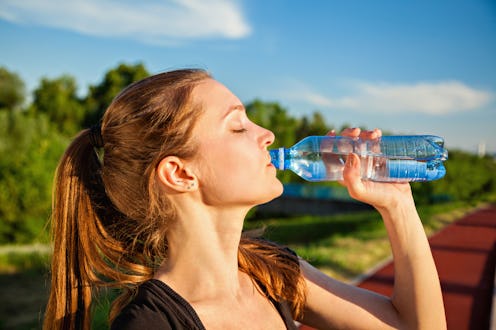News
Is It Safe To Drink Out Of Plastic Water Bottles?

Tap water has a pretty bad rep, even though that's pretty much what you get when you ask for that free drink of H2O at a restaurant. But the recent recall of 14 different water bottle brands due to a possible E. coli contamination has people wondering whether water bottles are safe to drink out of. The answer depends on the bottle and how you use it.
Those convenient plastic water bottles you buy at the gas station or your local grocery store aren't intended to be used more than once. After multiple uses, the plastic will be begin to wear and the possibility of chemicals leaking into your water increases. And while bottled water may look pretty innocent — how dirty can packaged water be, right? — bacteria can still grow in a plastic bottle's small crinkles and crevices, particularly around the cap area, aka the part that goes in your mouth. Add some heat, like when you leave a bottle in your car, and the bacteria will just multiply.
Plus, one-time water bottles are super cost inefficient. Bottled water can cost 250 to 10,000 times more than tap water, according to Gizmodo. But if you insist on reusing those quick recyclables, make sure to use mild detergent and wash the bottle thoroughly. Avoid using extremely hot water.
Reusable bottles are definitely better than one-time use bottles since they're made out of materials such as polycarbonate, which is intended to make the case much sturdier. But even then, the plastic will eventually break down over time and bisphenol A (BPA), a monomer found in polycarbonate, can be released into your water. BPA isn't necessarily a direct danger to you, but some studies show animals with high levels of BPA can suffer from cancer, diabetes, and obesity. If you're going to go the reusable route, better to opt for a stainless steel or glass bottle.
This is why you shouldn't be afraid of tap water. Under the Safe Water Drinking Act, the Environmental Protection Agency regulates the production, distribution, and quality of tap water and sets standards to make it OK for you to drink. The EPA requires specific testing and reporting procedures to ensure your tap water is never contaminated. And in most states, tap water also has fluoride to help prevent tooth decay.
Bottled water is regulated by the Food and Drug Administration, which means the entire product — the plastic bottle and the water inside — must meet the agency's standards. The FDA's rules are much less strict than the EPA's, so, plastic aside, the quality of bottled water could theoretically be much worse than tap water. Now, bottled water is fine to drink, don't get me wrong. But don't be quick to assume that pretty packaging will give you a better drinking experience. If you're thirsty, your best option could be to just turn on your faucet.